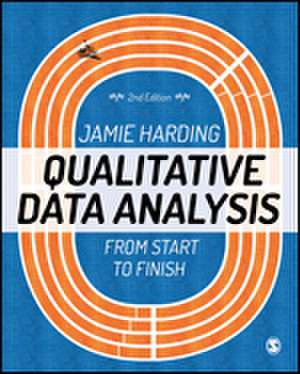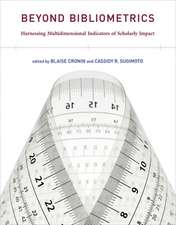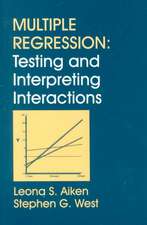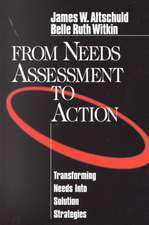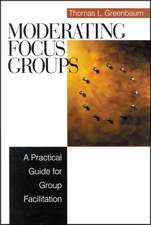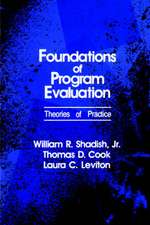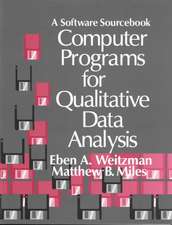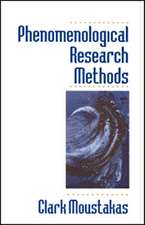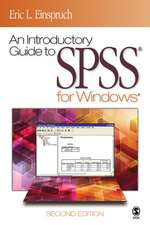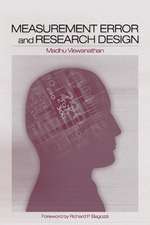Qualitative Data Analysis: From Start to Finish
Autor Jamie Hardingen Limba Engleză Paperback – 28 noi 2018
Using multidisciplinary data from interviews and focus groups Jamie Harding provides clear guidance on how to apply key research skills such as making summaries, identifying similarities, drawing comparisons and using codes.
The book sets out real world applicable advice, provides easy to follow best practice and helps you to:
· Manage and sort your data
· Find your argument and define your conclusions
· Answer your research question
· Write up your research for assessment and dissemination
Clear, pragmatic and honest this book will give you the perfect framework to start understanding your qualitative data and to finish your research project.
| Toate formatele și edițiile | Preț | Express |
|---|---|---|
| Paperback (1) | 352.83 lei 3-5 săpt. | +32.34 lei 5-11 zile |
| SAGE Publications – 28 noi 2018 | 352.83 lei 3-5 săpt. | +32.34 lei 5-11 zile |
| Hardback (1) | 926.18 lei 6-8 săpt. | |
| SAGE Publications – 3 dec 2018 | 926.18 lei 6-8 săpt. |
Preț: 352.83 lei
Nou
Puncte Express: 529
Preț estimativ în valută:
67.52€ • 70.23$ • 55.74£
67.52€ • 70.23$ • 55.74£
Carte disponibilă
Livrare economică 24 martie-07 aprilie
Livrare express 08-14 martie pentru 42.33 lei
Preluare comenzi: 021 569.72.76
Specificații
ISBN-13: 9781526402806
ISBN-10: 1526402807
Pagini: 328
Dimensiuni: 186 x 232 x 23 mm
Greutate: 0.62 kg
Ediția:Second Edition
Editura: SAGE Publications
Colecția Sage Publications Ltd
Locul publicării:London, United Kingdom
ISBN-10: 1526402807
Pagini: 328
Dimensiuni: 186 x 232 x 23 mm
Greutate: 0.62 kg
Ediția:Second Edition
Editura: SAGE Publications
Colecția Sage Publications Ltd
Locul publicării:London, United Kingdom
Recenzii
This is a must-have book for anyone considering qualitative data analysis. It is accessible and coherent and the many interesting examples make the processes of data collection and analysis very clear. The consistent format makes it very user friendly and I will use it to inform my own research as well as with my students.
This text helps students apply qualitative research to the practice context. The book is punctuated with ‘real life’ practical examples from the author’s own experience of conducting qualitative investigations. In my opinion this is the best text of its kind.
A comprehensive, pragmatic book that uses real research to illustrate the steps and decisions that a researcher needs to take when using qualitative methodology.
A superb guide for qualitative research. Thorough and accessible, it walks students through all the steps, and provides compelling examples along the way.
The author uses nice examples from his own work to demonstrate how and why to apply his tips and principles. This is particularly useful in demonstrating coding in section three.
[...]
this is a useful and readable book on the practicalities of conducting a qualitative research project, and one to which I will certainly return for reference
It's main premise is that, to really get under the skin of a research issue, the research needs to look much deeper into the 'psycho-biography' of research participants. This mapping of people's psycho-biography determines people's personal identity -- their motives, personal style, and how they behave
[...]
Layder criticizes most research projects as being too one dimensional and simplistic. Investigative research is a largely exploratory methods of research. It encourages researchers to map the relevant psycho-biographies of individuals to formulate an initial 'conceptual scaffold' that is the basis for the explanation of the social behaviour under investigation. This guides and directs data collection processes. But Layder also advises being open to new concepts and encourages researchers to keep researching to test and/or revise theories and hypotheses
This text helps students apply qualitative research to the practice context. The book is punctuated with ‘real life’ practical examples from the author’s own experience of conducting qualitative investigations. In my opinion this is the best text of its kind.
A comprehensive, pragmatic book that uses real research to illustrate the steps and decisions that a researcher needs to take when using qualitative methodology.
A superb guide for qualitative research. Thorough and accessible, it walks students through all the steps, and provides compelling examples along the way.
The author uses nice examples from his own work to demonstrate how and why to apply his tips and principles. This is particularly useful in demonstrating coding in section three.
[...]
this is a useful and readable book on the practicalities of conducting a qualitative research project, and one to which I will certainly return for reference
It's main premise is that, to really get under the skin of a research issue, the research needs to look much deeper into the 'psycho-biography' of research participants. This mapping of people's psycho-biography determines people's personal identity -- their motives, personal style, and how they behave
[...]
Layder criticizes most research projects as being too one dimensional and simplistic. Investigative research is a largely exploratory methods of research. It encourages researchers to map the relevant psycho-biographies of individuals to formulate an initial 'conceptual scaffold' that is the basis for the explanation of the social behaviour under investigation. This guides and directs data collection processes. But Layder also advises being open to new concepts and encourages researchers to keep researching to test and/or revise theories and hypotheses
Cuprins
STAGE 1 RESEARCH DESIGN AND PREPARATION
Chapter 1 Introduction to qualitative social research
Chapter 2 Designing qualitative research: your key questions
Chapter 3 Practical issues in qualitative research
STAGE 2 DATA COLLECTION AND MANAGEMENT
Chapter 4 Collecting and managing interview data
Chapter 5 Collecting and managing focus group data
STAGE 3 DATA ANALYSIS AND INTERPRETATION
Chapter 6 A brief introduction to the analysis of qualitative data
Chapter 7 Step one for analysing your interview data - making summaries and comparisons
Chapter 8 Step two for analysing your interview data – using codes
Chapter 9 Step three for analysing your interview data - finding conceptual themes and building theory
Chapter 10 Analysing your focus group data
Chapter 11 Alternative approaches to analysing qualitative data
STAGE 4 DISSEMINATION
Chapter 12 Writing about your qualitative research
Chapter 1 Introduction to qualitative social research
Chapter 2 Designing qualitative research: your key questions
Chapter 3 Practical issues in qualitative research
STAGE 2 DATA COLLECTION AND MANAGEMENT
Chapter 4 Collecting and managing interview data
Chapter 5 Collecting and managing focus group data
STAGE 3 DATA ANALYSIS AND INTERPRETATION
Chapter 6 A brief introduction to the analysis of qualitative data
Chapter 7 Step one for analysing your interview data - making summaries and comparisons
Chapter 8 Step two for analysing your interview data – using codes
Chapter 9 Step three for analysing your interview data - finding conceptual themes and building theory
Chapter 10 Analysing your focus group data
Chapter 11 Alternative approaches to analysing qualitative data
STAGE 4 DISSEMINATION
Chapter 12 Writing about your qualitative research
Notă biografică
Descriere
Helping to bridge the gap between data gathering and data analysis, this book is based on a set of easy-to-follow steps woven throughout the text, enabling students to get stuck in and working with qualitative data fast.
